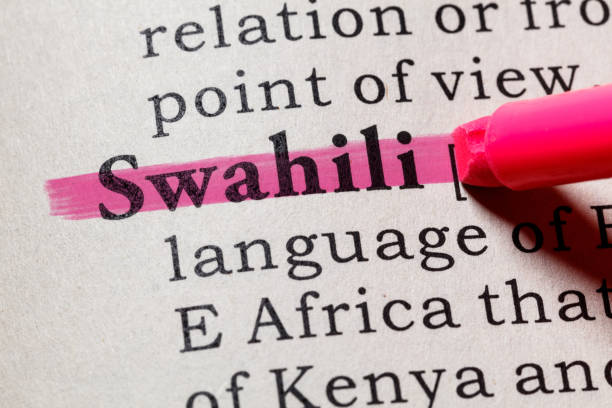Empowering Rural Africa: The Importance of Swahili in Development

Swahili; In many parts of Africa, the local language plays a critical role in development, and Swahili is no exception. Swahili, also known as Kiswahili, is the most widely spoken language in East Africa, and it has been used as a language of communication for centuries. However, in recent years, the importance of Swahili has become even more apparent, as it has become a key driver for economic growth and development in rural areas.
Not only does it help to bridge communication gaps between different communities, but it also helps to promote cultural unity and understanding. In this blog post, we’ll explore the importance of Swahili in rural Africa, its impact on development, and how it is being used to empower communities across the continent.
The significance of language in development
Language plays a crucial role in the development of any community or region. It acts as a bridge that connects people, facilitates communication, and enables the sharing of ideas, knowledge, and culture. In the context of rural Africa, the importance of language becomes even more pronounced.
One language that holds tremendous significance in the development of rural Africa is Swahili. Swahili, also known as Kiswahili, is a Bantu language spoken by millions of people across East Africa. It serves as the lingua franca of the region, breaking down barriers and fostering unity among diverse ethnic groups.
In the development process, language acts as a catalyst for social and economic progress. It empowers individuals by providing them with a means to express their thoughts, needs, and aspirations. When people can communicate effectively, they can engage in meaningful conversations, participate in decision-making processes, and advocate for their rights.
Furthermore, language is essential for education and knowledge dissemination. By embracing and promoting Swahili, rural communities gain access to education in their mother tongue. This not only enhances learning outcomes but also preserves and celebrates their cultural heritage.
Language also plays a pivotal role in economic development. Swahili serves as a tool for entrepreneurship and trade, enabling communities to engage in local and international commerce. By embracing Swahili, rural Africa can tap into a larger market and create opportunities for economic growth and development.
Moreover, language empowers individuals to engage with technology and information. In today’s digital age, access to information and digital platforms is crucial for socio-economic advancement. By embracing Swahili, rural communities can bridge the digital divide and leverage technology to enhance various aspects of their lives, including healthcare, agriculture, and entrepreneurship.
In conclusion, the significance of language in the development of rural Africa cannot be overstated. Swahili, with its widespread usage and cultural significance, plays a pivotal role in empowering individuals, fostering unity, and facilitating progress. By recognizing and promoting the importance of Swahili, we can pave the way for a brighter and more inclusive future for rural Africa.
The role of Swahili as a lingua franca in Africa
Swahili, often referred to as Kiswahili, plays a significant role as a lingua franca in Africa, particularly in the rural areas. With over 100 million speakers, it is estimated to be the second most widely spoken African language on the continent. Its importance cannot be overstated, as it serves as a bridge between different ethnic groups, tribes, and nations, fostering communication, unity, and understanding.
As a lingua franca, Swahili enables individuals from diverse backgrounds to communicate effectively, breaking down language barriers and promoting social cohesion. In rural Africa, where various local languages are spoken, Swahili acts as a unifying force, facilitating trade, education, and cultural exchange. It serves as a common language for conducting business transactions, negotiating agreements, and resolving disputes.
Moreover, the language plays a vital role in the development and empowerment of rural communities. By providing a standardized means of communication, it empowers individuals to access information, education, and opportunities that would otherwise be limited by language barriers. Swahili is increasingly utilized in formal education systems, allowing children in rural areas to receive quality education and interact with broader networks of knowledge and resources.
Furthermore, the language has been instrumental in promoting cultural preservation and identity. It acts as a medium through which traditional stories, folklore, and wisdom are transmitted from one generation to another. By preserving and promoting local languages and cultural heritage, Swahili contributes to the richness and diversity of African societies.
In conclusion, Swahili’s role as a lingua franca in Africa, particularly in rural areas, is of utmost importance. It fosters communication, unity, and understanding among diverse communities, enabling economic development, educational opportunities, and cultural preservation. As Africa continues to progress and empower its rural regions, recognizing and investing in the importance of Swahili will be key to sustainable development and inclusive growth.
Historical importance of Swahili in East Africa
The historical importance of Swahili in East Africa is deeply rooted in the region’s rich cultural heritage and centuries-old trade networks. Swahili, also known as Kiswahili, is an intricate language that emerged as a lingua franca along the Swahili Coast, stretching from Somalia in the north to Mozambique in the south.
Dating back to the 9th century, Swahili developed as a fusion of Bantu languages with Arabic, Persian, and other languages spoken by traders from the Arabian Peninsula, Persia, and the Indian subcontinent. This unique blend of influences transformed Swahili into a vibrant language that showcased the cultural exchange and intermingling of diverse communities.
During the medieval period, the Swahili city-states flourished as important centers of trade, attracting merchants from across the Indian Ocean. Swahili served as the language of commerce, diplomacy, and social interaction, facilitating communication between people from various ethnic backgrounds and enabling the growth of prosperous trading networks.
The influence of Swahili extended far beyond coastal regions. As merchants traveled inland, they brought the language with them, spreading its usage across vast territories. Swahili became not only a means of communication but also a marker of identity and cultural unity for communities in East Africa.
In addition to its role in trade and communication, Swahili also played a significant part in the spread of Islam in the region. As Arabic traders settled along the Swahili Coast, they brought with them their religious beliefs and teachings, which were disseminated in Swahili. This led to the emergence of a Swahili-Islamic culture that influenced various aspects of East African society, from architecture and literature to religious practices and social norms.
Today, Swahili continues to be a vital language in East Africa, serving as the official language of several countries, including Tanzania, Kenya, and Uganda. Its historical significance and widespread usage make it an essential tool for fostering development and empowerment in rural communities. By promoting the teaching and preservation of Swahili, we can unlock opportunities for education, economic growth, and cultural preservation, ultimately empowering rural Africa to thrive in the modern world while preserving its unique heritage.
Swahili as a tool for empowerment in rural Africa
Swahili, a widely spoken language in East Africa, is not only a means of communication but also a powerful tool for empowerment in rural Africa. With over 100 million speakers, Swahili has the potential to bridge the gap between development initiatives and the communities they aim to serve.
In rural Africa, where access to education and opportunities is often limited, the ability to communicate effectively is crucial for personal and economic growth. By promoting the use of Swahili, development organizations can empower individuals to participate actively in decision-making processes, access information, and engage in economic activities.
One of the key benefits of using Swahili as a tool for empowerment is its accessibility. Unlike some other African languages that are specific to certain regions or ethnic groups, Swahili is widely understood across different countries and cultures in East Africa. This makes it easier for individuals from diverse backgrounds to come together, share ideas, and collaborate on projects that can uplift their communities.
Furthermore, Swahili can serve as a catalyst for entrepreneurship and economic development. By providing training and resources in Swahili, rural communities can acquire the necessary skills to start and manage their own businesses. This not only creates employment opportunities but also fosters a sense of self-reliance and economic independence.
In addition, Swahili can play a vital role in preserving traditional knowledge and cultural heritage. Many rural communities in Africa have rich oral traditions and local wisdom that are passed down through generations. By using Swahili as a medium for education and storytelling, these valuable cultural assets can be preserved and shared with younger generations, ensuring their continuity and relevance in a rapidly changing world.
Overall, Swahili has the potential to empower rural Africa by breaking down communication barriers, fostering economic growth, and preserving cultural heritage. It is crucial for development organizations, policymakers, and educators to recognize the importance of Swahili and invest in initiatives that promote its use as a tool for empowerment. By doing so, we can unlock the full potential of rural communities and contribute to sustainable development in Africa.

How Swahili can bridge communication gaps
Swahili, the widely spoken language in East Africa, holds significant importance in bridging communication gaps in rural Africa. As development efforts continue to focus on improving the quality of life in rural communities, effective communication becomes a critical factor. Many rural areas in Africa consist of diverse ethnic groups with their respective languages, making it challenging to establish a common means of communication.
This is where Swahili plays a transformative role. With its widespread usage across borders and diverse communities, Swahili acts as a unifying language that enables effective communication among people from different ethnic backgrounds. It serves as a valuable tool for promoting inclusivity and fostering collaboration in rural Africa.
By embracing Swahili as a common language, rural communities can transcend linguistic barriers and enhance connectivity. This opens up opportunities for improved education, healthcare, trade, and overall development. Swahili acts as a conduit for sharing knowledge, ideas, and experiences, empowering individuals to participate actively in their own development.
Moreover, the adoption of Swahili as a means of communication promotes cultural exchange and understanding. It creates a sense of belonging and unity among diverse communities, fostering social cohesion and reducing conflicts arising from language-related misunderstandings.
In addition to its role in intra-community communication, Swahili also facilitates interaction with external actors such as NGOs, government agencies, and international organizations. These entities often work to support rural development initiatives, and having a common language simplifies communication channels, streamlines processes, and enhances collaboration.
In conclusion, Swahili holds immense significance in bridging communication gaps in rural Africa. Its wide usage and acceptance as a lingua franca foster inclusivity, enable collaboration, and promote cultural exchange. Embracing Swahili as a means of communication paves the way for enhanced development efforts, empowering rural communities to actively participate in shaping their own future.
Swahili as a means of preserving cultural heritage
Swahili, the widely spoken language in East Africa, holds immense significance in preserving the cultural heritage of rural Africa. As development continues to shape the landscape of these regions, it becomes crucial to recognize the value of maintaining cultural roots and traditions. Swahili serves as a powerful tool in achieving this.
With its origins deeply rooted in the Bantu language family, Swahili embodies the rich history, customs, and traditions of the local communities. By embracing and promoting Swahili, rural Africa can ensure the preservation of its diverse cultural heritage for future generations.
The language acts as a bridge that connects people across various ethnic groups, fostering unity and understanding. By speaking Swahili, individuals are able to communicate and engage with one another, breaking down barriers and promoting a sense of belonging within their communities.
Moreover, Swahili has become a symbol of African identity and pride. It represents the resilience and strength of the people, serving as a reminder of their shared history and struggles. Through the preservation and promotion of Swahili, rural Africa can assert its cultural identity in a rapidly changing world.
In addition to its cultural significance, Swahili plays a vital role in economic development. As rural areas strive to participate in the global marketplace, having a common language becomes essential for successful trade and commerce. Swahili acts as a unifying force, enabling individuals to engage in business transactions, negotiate deals, and establish partnerships.
Furthermore, by embracing Swahili, rural communities can empower themselves and gain a stronger voice on the national and international stage. Language is a powerful tool for self-expression, and through Swahili, individuals can assert their rights, advocate for their needs, and actively participate in decision-making processes.
In conclusion, the importance of Swahili in preserving the cultural heritage of rural Africa cannot be overstated. By embracing this language, communities can maintain their traditions, foster unity, and empower themselves in the face of development. Swahili serves as a powerful symbol of African identity and provides a means for rural Africa to thrive in an interconnected world while staying true to its roots.
The impact of Swahili on education and literacy rates
Swahili, often referred to as the lingua franca of East Africa, plays a crucial role in the development of education and literacy rates in rural Africa. With its widespread usage across multiple countries, Swahili has become a unifying language that facilitates communication and learning opportunities for millions of people.
One of the major benefits of Swahili in education is its accessibility. As a language that is relatively easy to learn and understand, it serves as a bridge between different ethnic groups and tribes, breaking down language barriers and promoting inclusivity. This is particularly significant in rural areas where students come from diverse linguistic backgrounds.
By incorporating Swahili into the curriculum, educational institutions can create a conducive learning environment where students can effectively communicate and express themselves. This fosters a sense of belonging and confidence among students, which in turn enhances their overall academic performance.
Moreover, the use of Swahili in education promotes cultural preservation and pride. By incorporating local languages and traditions into the curriculum, students are encouraged to embrace their heritage and develop a strong sense of identity. This not only boosts their self-esteem but also strengthens the social fabric of rural communities.
Furthermore, the impact of Swahili extends beyond the classroom. As literacy rates improve, individuals gain access to a wider range of opportunities, including better employment prospects, entrepreneurship, and participation in community development initiatives. Swahili acts as a catalyst for socioeconomic advancement, empowering individuals to break the cycle of poverty and contribute to the overall development of their communities.
In conclusion, the importance of Swahili in education and literacy rates cannot be overstated. By promoting inclusivity, cultural preservation, and socioeconomic empowerment, Swahili serves as a powerful tool for transforming rural Africa and empowering its people. Efforts to integrate Swahili into educational systems should be prioritized, ensuring that every individual has equal access to quality education and the opportunity to thrive.
Swahili in business and economic development
Swahili, a widely spoken language in East Africa, holds significant importance in the realm of business and economic development. As the lingua franca of the region, Swahili acts as a unifying force, bridging the communication gap between diverse communities and fostering collaboration.
In the business landscape, Swahili serves as a tool for effective communication, enabling entrepreneurs and investors to connect with local communities. By understanding and utilizing Swahili, businesses can establish meaningful relationships, build trust, and gain valuable insights into the cultural nuances and preferences of the market.
Moreover, Swahili plays a pivotal role in economic development by empowering rural communities. In many rural areas of Africa, where access to education and resources may be limited, Swahili acts as a means of inclusion and empowerment. It provides individuals with the opportunity to participate in economic activities, engage in trade, and access vital information and services.
The use of Swahili in business also enhances the overall socio-economic fabric of rural Africa. By embracing the language, enterprises can create job opportunities, promote entrepreneurship, and contribute to the growth of local economies. Additionally, utilizing Swahili as a language of commerce can help preserve and promote indigenous knowledge, culture, and traditions, fostering a sense of pride and identity among the local population.
Furthermore, embracing Swahili in business and economic development initiatives can lead to greater regional integration. With its widespread usage across East Africa, Swahili facilitates cross-border trade and cooperation. It enables businesses to expand their reach beyond national boundaries, tapping into a larger consumer base and creating avenues for regional economic growth.
In conclusion, recognizing the significance of Swahili in business and economic development is crucial for empowering rural Africa. By leveraging the power of this language, businesses can foster inclusivity, drive economic growth, and contribute to the overall development of the region. As Africa continues to progress, embracing Swahili as a language of opportunity will undoubtedly play a vital role in unlocking the immense potential of rural communities and promoting sustainable development.
Overcoming challenges and promoting Swahili in rural areas
Overcoming challenges and promoting Swahili in rural areas is crucial for the empowerment and development of rural Africa. Swahili, as a widely spoken language across East Africa, holds immense potential to bridge communication gaps and foster unity among diverse communities in rural areas.
However, there are several challenges that need to be addressed in order to promote the use and importance of Swahili effectively. One of the main challenges is the lack of resources and educational infrastructure in rural areas. Many remote regions struggle with limited access to quality education and language learning materials, making it difficult for locals to embrace and learn Swahili.
To overcome this, initiatives should be implemented to provide accessible and affordable education resources, including textbooks, audiovisual materials, and online platforms, that are specifically tailored for rural communities. Collaborations between governmental organizations, NGOs, and educational institutions can play a vital role in creating and distributing such resources.
Additionally, community engagement and awareness campaigns are crucial in promoting the value of Swahili. Local leaders, teachers, and influencers can play a pivotal role in advocating for the language and encouraging its usage in daily life. Organizing community events, cultural festivals, and language immersion programs can help create a sense of pride and identity around Swahili, fostering its acceptance and usage in rural areas.
Furthermore, incorporating Swahili into various aspects of rural development, such as healthcare services, agricultural training, and entrepreneurship programs, can have a transformative impact. By offering resources and training in Swahili, individuals in rural areas can better understand and participate in these vital sectors, leading to improved livelihoods and sustainable development.
In conclusion, overcoming challenges and promoting Swahili in rural areas is essential for empowering rural Africa. By providing accessible education resources, raising awareness, and integrating Swahili into development initiatives, we can harness the power of language to drive positive change and unlock the full potential of rural communities.

The future of Swahili in Africa’s development
In conclusion, the future of Swahili in Africa’s development holds immense potential. As we have explored throughout this blog post, Swahili has proven to be a unifying language, bridging the linguistic gap among diverse ethnic groups and promoting cultural exchange. It has also played a pivotal role in education, governance, and commerce, enabling effective communication and fostering economic growth.
With the ever-increasing connectivity and globalization, the importance of Swahili cannot be understated. As Africa continues to undergo rapid urbanization and technological advancements, it is crucial to ensure that the rural areas are not left behind. Swahili can serve as a catalyst for empowerment, enabling rural communities to participate actively in the socio-economic development of their regions.
Furthermore, the promotion and preservation of Swahili as a national language can foster a sense of pride and identity among Africans. By embracing their linguistic heritage, individuals can gain a stronger sense of belonging and unity, fostering a collective spirit that can drive progress and overcome challenges.
As we look towards the future, it is essential for governments, educational institutions, and development organizations to recognize the value of Swahili and invest in its promotion and development. This includes initiatives such as expanding Swahili language programs, encouraging its use in official capacities, and supporting cultural activities that celebrate Swahili heritage.
By embracing Swahili, Africa can harness its full potential and foster inclusive development that leaves no one behind. It is through the empowerment of rural communities and the preservation of cultural diversity that Africa can strive towards a brighter and more prosperous future for all its inhabitants.
In conclusion, Swahili stands as a powerful tool for empowerment, fostering development, and shaping the future of Africa. Let us embrace the beauty and significance of this language, as we work towards a more inclusive and prosperous Africa.
In conclusion, we have explored the vital role that Swahili plays in empowering rural Africa and fostering development. By understanding the importance of language in communication and education, we can work towards bridging the gap between rural communities and the opportunities available to them. Swahili serves as a powerful tool for inclusivity, cultural preservation, and economic growth. As we continue to support and invest in initiatives that promote Swahili education, we can contribute to a brighter future for rural Africa. Let us embrace the richness of Swahili and empower communities to thrive and prosper. Together, we can make a lasting impact on the development of rural Africa.
